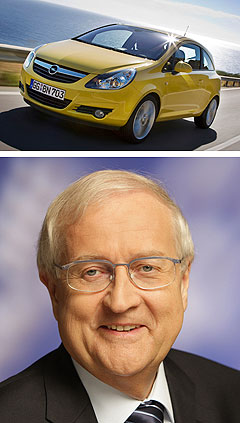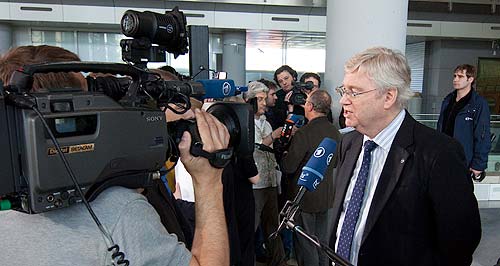Make / Model Search
News - OpelGM stands firm in Europe after German loan rejectionPushing ahead: Opel CEO Nick Reilly can't understand Germany’s loan application rejection, but is pressing on with all-new micro-car. Opel to continue model plans, including sub-light mini, despite $1.6b shortfall11 Jun 2010 By TERRY MARTIN GENERAL Motors’ European arm Opel has vowed to continue its new-model development program, including work on a sub-light mini-car, despite the German government this week rejecting the auto giant’s request for €1.1 billion ($A1.6b) in loan guarantees. Opel/Vauxhall chief executive Nick Reilly said that it would suffer delays as a result of the government’s decision, but said key products would not be affected and that it would continue to work with state governments in Germany, all of which have Opel plants in their region, to make up 25 to 50 per cent of the required amount. The €1.1 billion is a large slice of the overall €3.7 billion ($A5.3b) overhaul GM has identified as necessary for its European operations to return to profitability. It had planned to break even in 2011, and to return to profit by 2012. Overseas reports indicate that Opel is also seeking €333 million ($A476m) in loan guarantees from the UK, €437 million ($A624m) from Austria and Spain combined, and €50 million ($A71m) in project financing from Poland. GM was expecting to contribute €1.9 billion in US taxpayer funding, but that could now increase – or force cuts in other areas of operations. The core part of Opel/Vauxhall’s so-called ‘plan for the future’ is the development and introduction of new models, including a new small car that sits below the Corsa compact hatch. This is part of an €11 billion investment into new products, alternative propulsion systems and “other growth initiatives”. “I am certainly intending to work out a plan that allows us to keep the major investments in our major new products – that is what is going to lead our success in the future," Mr Reilly said in a conference call, adding that the micro-car program was continuing according to plan and would be sourced out of Germany rather than South Korea. “There may be some things that we might be able to delay a bit, or wait until we are generating more money ourselves, but not in terms of any of the major products.  Frop top: Opel Corsa, German economics minister Rainer Bruederle Frop top: Opel Corsa, German economics minister Rainer Bruederle“It is definitely my intent to maintain the major elements of our plan going forward – that is, the restructuring, but even more important than that, the investment we have in new product and new technologies. “We clearly will have to look at the spending curve, and the availability of funding that we are going to end up with, and obviously I’ll be discussing this with our parent company.” Mr Reilly said it was possible that GM could fund the shortfall itself, but indicated that this course of action would not be well received in the US and could in turn have ramifications on its operations in other markets. Although he did not name a specific market, Holden’s Australian operations are obviously one of these. “Could GM Company pay for the whole lot? In theory, it’s possible. But then they would have to do something else less in the US or elsewhere,” he said. “You have to remember they (GM) are operating largely because of US taxpayers’ money, so they have to be very careful about what they spend outside the US in particular. They certainly didn’t expect to have to fund the whole lot, and that’s why we should be looking at all different funding options that are open to us. “They will be one, but certainly not the only one.” In announcing the German government’s rejection of the Opel loan guarantees, federal minister of economics and technology Rainer Bruederle said he was convinced GM had adequate financial resources to turn Opel/Vauxhall around, making a “conservative calculation” that it had free liquidity of about €10 billion, even after it had paid back credits from the US and Canadian governments. “GM is economically much better off than a year ago,” Mr Bruederle said, adding that he was attempting to strike the “right balance” between market forces and state intervention. “After the immense economic (aid) programs, each of which has incidentally Opel benefited doubly so, the pendulum must swing back towards the market. “We have to move again in the proper courses of the social market economy. And market competition has to come into play much stronger again. The state economy will be pushed back. The state is not a better entrepreneur.” Mr Bruederle also said that GM took on risk itself in rejecting the deal brokered by German chancellor Angela Merkel late last year to sell a majority stake in Opel to a consortium led by Canadian parts giant Magna International. The other main reason behind the decision, he said, was that the “automotive market is characterised by significant overcapacity” and that “government support for a (particular) company leads to serious distortions of competition”. “The guaranteed jobs at Opel jeopardises jobs at other companies in the industry. From the economic side, I am strongly against this threat of competition distortions,” he said. GM needs the funding to continue with its restructuring program in Europe, which includes closing down its production plant in Antwerp, Belgium, and reducing Opel’s workforce by 8300, down from the current level of around 48,000 employees. Some 4000 of these job cuts would be made in Germany. In response, Mr Reilly said: “GM is naturally very disappointed, as is Opel, with this decision, after such a very long process and we have spent a lot of time answering many, many hundreds of questions (and) being reviewed by many, many different committees. “I don’t particularly understand the reasons why. I understand that Mr Bruederle has said that it wasn’t an easy decision, and that some jobs might be at risk. He also said that he didn’t believe the state should get involved. “That’s a difficult one for me to understand because countries and the EU have specific programs that have been approved by all the countries and by the EU to assist companies that have been affected by the global crisis. “The other reason given was that support could lead to distortions in the automotive industry. Well, just last year alone, the European automotive industry received €8.5 billion from the EIB (European Investment Bank), which of course is a government-sponsored and government-financed institution and Opel received none of that. So I don’t understand that reason either. “And then finally, I understand that (Germany believes) GM has enough money to restructure Opel. Well, in theory that’s probably true, but GM has lots of calls on its finances. “It’s just coming out of bankruptcy from last year, and it has already committed €1.9 billion to the restructuring of Opel and towards our investment in new product, and what we are looking for is to get us through this period of low market so that we can keep investing in new products and our plants,” he said.  Read more17th of February 2010  Opel’s massive makeover to cost $16.8 billionGM Europe set to splurge on new models – and some might make it to Oz22nd of January 2010  Opel shuts Antwerp factoryGM wields the axe on Belgian Astra plant as it finally begins European restructuring13th of November 2009  GM may go it alone on $5.3 billion Opel revampGerman minister tells GM not to count on its aid in Opel rescue mission |
Click to shareOpel articlesMotor industry news |











Facebook Twitter Instagram